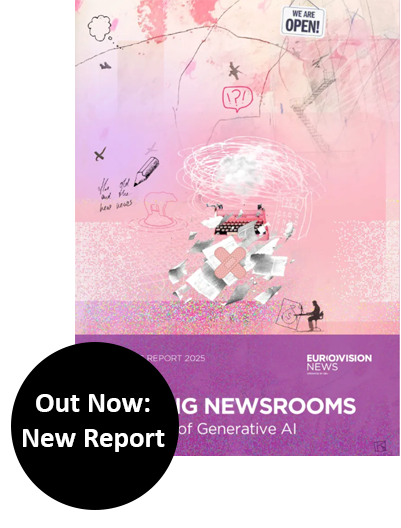Is it okay to laugh heartily even when the situation is serious? Yes, because it is precisely in these situations that humor can help journalism to make formats interesting even for people who might not care otherwise. A plea for more humor – in everyday life and at work.
Doom-scrolling rarely works. Research shows that journalism on climate change is more likely to have an impact if it not only highlights the many different issues involved, but also offers a few solutions. People who report that they regularly avoid the news would like to see more offerings that give them hope and explain things, rather than having to digest the same drama over and over again. This is also confirmed by the Reuters Institute’s latest Digital News Report. But what about humor? Is it okay to laugh heartily, even when the situation is serious?
One might seek permission posthumously from great humorists. In the 1942 comedy “To Be or Not to Be,” director Ernst Lubitsch even had his actors joke about concentration camps while World War II raged outside. But it’s not just about being allowed to joke – subject to a few rules, of course. Evidence suggests that humor is particularly effective at spurring people to action. This is, because jokes convey unpleasant truths the light way. They hold up a mirror to people without making them feel guilty, and for that very reason invite them to reflect about their behavior.
Laughing at yourself instead of feeling guilty
This also works when it comes to climate change. Matt Winning is a Scottish environmental economist. After work, he often climbs up London stages as a stand-up comedian; for a few years now, he has been combining hobby and profession. “We have to make content for people we don’t make content for,” he said in an interview for the report “Climate Journalism That Works: Between Knowledge and Impact.”
His shows, he says, are not so much for environmental professionals, activists and policy experts, as for those people who have been more peripherally involved with climate action. He says he is touched when such guests linger around at the end of the show to tell him that they have now got rid of their car, given up on flying for their summer vacations or found out about heat pumps. In his book “Hot Mess: What on earth can we do about climate change?” Winning tries to get people to understand the topic in a playful way.
Maxwell Boykoff and his colleague Beth Osnes are trying out something similar at the University of Colorado in Boulder. They had initiated the ” Inside the Greenhouse” project as a collaboration between the departments of theater and environmental policy. They published their first findings from it in an academic article in 2019: A light approach to the issues around climate change helps students confront their own feelings, especially fears, deal with them creatively and become better climate communicators, they said.
Why humor can help at the working place
Professors Jennifer Aaker and Naomi Bagdonas teach humor in management at Stanford Business School. In their book “Humour, Seriously – Why Humour is a Secret Weapon in Work and in Life” they describe the role that cheerfulness can play in achieving (business) goals. Humor builds community, strengthens problem-solving skills and resilience. Managers who can laugh at themselves appear close and authentic.
In journalism, young people in particular appreciate humorous formats. It is important to them that content is useful, but they also like it to be fun. A study published in 2021 by the Annenberg School for Communication at the University of Pennsylvania found that young consumers remembered news better when it was presented in a humorous way. More brain regions would be activated during laughter. The rise of TikTok as a channel for news delivery – also documented in the recent Digital News Report – shows how quickly a platform specializing in lighter fare can catch on.
Of course, humor will always be just a complementary form of communication. This is the case also because only a few people have mastered the subject to perfection. For example, one basic rule is: Humor works when you punch up or among your peers. Anyone who makes fun of those conceived to be less powerful is most likely to miss the mark – which is why joking is a tightrope walk for leaders. In any case, what someone laughs at and what jokes he or she makes depends on the cultural context but also reveals a lot about character. As Aaker and Bagdonas write, “Humor is a kind of intelligence you can’t fake.”
This text first appeared in German as an Op Ed on Focus online on June 23, 2023. It was translated with www.DeepL.com/Translator and edited.



